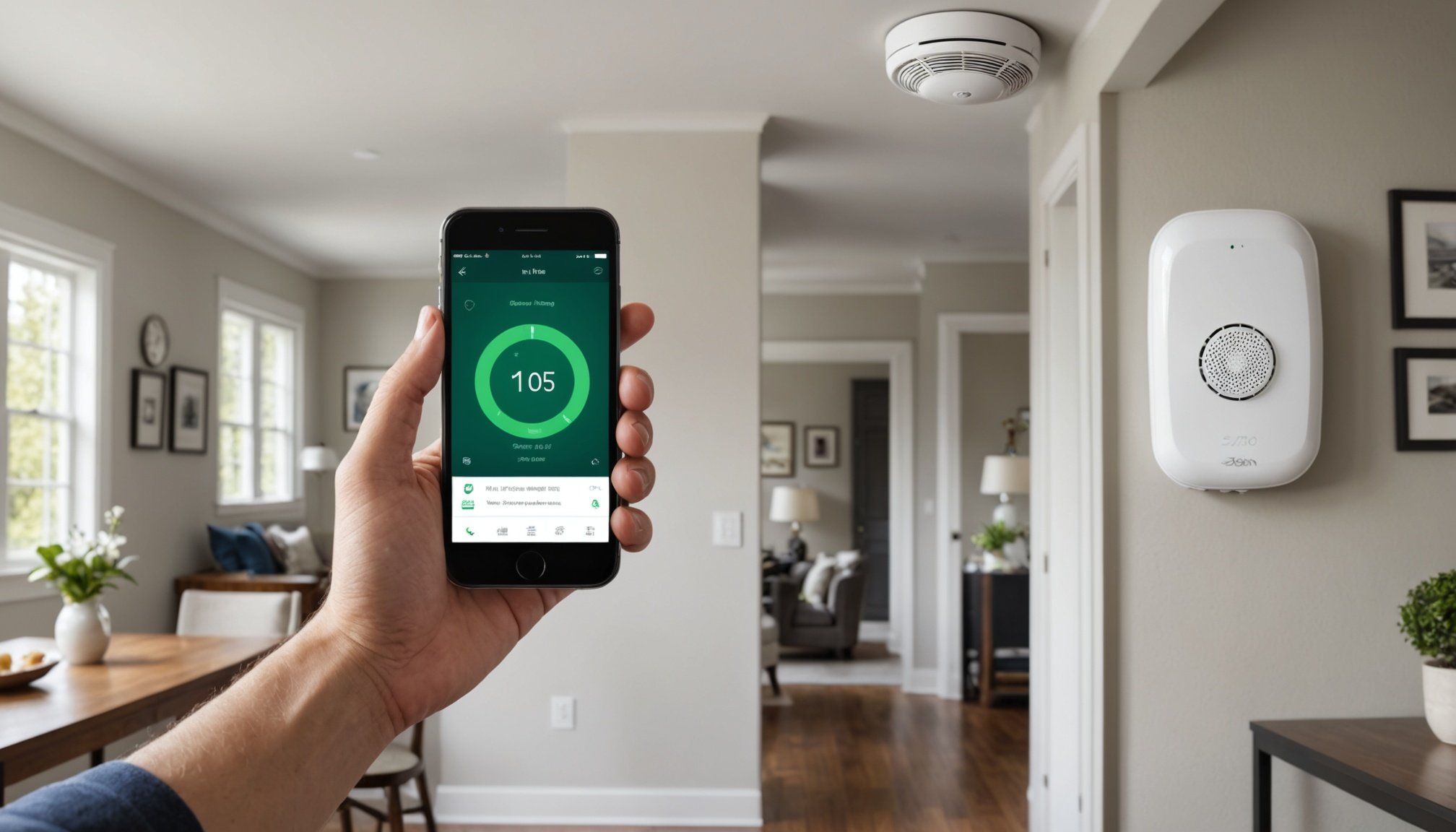Introduction to Smart Smoke Alarms
As technology continues to evolve, the role of smart smoke alarms in enhancing home safety becomes increasingly significant. Traditional smoke alarms, while effective, rely on basic mechanisms to detect smoke and sound an alarm. In comparison, smart smoke alarms leverage technology integration to offer advanced functionalities that surpass conventional systems.
Smart technology enhances traditional functions by providing continuous monitoring, even when you’re not at home. For example, these intelligent devices can send alerts to your phone upon detecting smoke, ensuring prompt awareness regardless of your location. This feature is particularly beneficial in scenarios where every second counts to ensure safety.
In parallel : Unlock Your Phone’s Potential: The Ultimate Handbook for Hassle-Free Smart Coffee Maker Control
Moreover, smart smoke alarms often have additional capabilities, such as distinguishing between types of smoke, which minimizes false alarms and enhances reliability. Integration with other smart home systems further extends their utility, allowing users to manage and oversee their home’s safety comprehensively.
As we delve deeper into the benefits of these technology integrations, it becomes clear that incorporating smart smoke alarms is a proactive step towards a safer home environment. Understanding their full potential and how they can transform traditional home safety measures into intelligent, responsive systems illustrates the importance of progressing beyond conventional smoke detection solutions.
Also to read : Unlocking the Power of Daily Reflection: A Step-by-Step Guide to Crafting Your Digital Journal on a Tablet
Benefits of Using Smartphones for Smoke Alarm Management
Smartphones introduce significant home security benefits by enhancing smart smoke alarms’ functionality. One of the prime advantages is the ability to remotely monitor your home’s status. This capability ensures you receive real-time updates and alerts while on the go, maintaining peace of mind about safety.
Instant alerts sent directly to your smartphone when smoke is detected are crucial. Quick notifications can significantly reduce potential risks by enabling immediate action, even if you are miles away. This feature proves pivotal in protecting your home and loved ones.
Integrating smart smoke alarms with other smart home systems further maximizes their potential. When connected to other technologies, such as security cameras or smart lights, these alarms offer a comprehensive security network. This interconnected setup provides an extra layer of vigilance, allowing for a more robust response in emergencies.
Moreover, smartphones facilitate seamless operation and management of various devices through standardized apps, pushing the envelope in user-friendly home automation. By utilising compatible apps and effective integration, smart technology ensures every aspect of home safety is retained, reinforcing the protective environment effortlessly. Employing smartphone-controlled systems not only enhances safety but also simplifies managing your smart home’s solutions.
How to Integrate Your Smartphone with Smoke Alarms
Smartphone integration with smart smoke alarms has become increasingly essential for homeowners focusing on home automation. This integration process involves straightforward steps that ensure your smartphone is synced efficiently with your smoke alarms. First, identify if your smoke alarms are compatible with mobile apps designed for them. Many manufacturers offer their own apps, simplifying the setup process.
Begin by downloading the specified app from your phone’s app store, then follow the setup guide within the app. Usually, this involves creating an account and connecting the smoke alarm to your home Wi-Fi network through the app. For troubleshooting tips, ensure your phone’s Bluetooth is enabled and the device is in close proximity during setup. Additionally, double-checking Wi-Fi credentials can resolve connectivity issues.
Common concerns with integration often revolve around compatibility and network reliability. However, manufacturers offer extensive support and detailed guides to troubleshoot common problems. If issues persist beyond the app’s troubleshooting guide, consider relying on customer support for more in-depth assistance. Integrating smartphones with smoke alarms isn’t just about convenience; it’s a step towards securing a responsive and well-coordinated home safety network. By having this system in place, homeowners gain an advanced way to protect their property and loved ones.
Recommended Apps for Smoke Alarm Control
Using a smoke alarm app enhances your home’s safety by providing convenient management and monitoring solutions. Choosing the right app can be crucial. Here, we’ll explore top recommendations across different platforms.
Best Apps for iOS
Among the leading iOS smoke alarm management apps is the Nest app, which offers seamless integration with Nest Protect alarms. It features instant notifications, compatibility with other smart devices, and regular system updates for reliability. Reviews praise its user-friendly interface and robust alert system.
Another strong contender is the Eve app, designed for HomeKit users. It allows easy control over HomeKit-enabled smoke detectors from your iPhone. Users commend its intuitive dashboard and efficient alert capabilities.
Best Apps for Android
For Android users, the SmartThings app ranks high due to its versatility. It integrates effortlessly with Samsung SmartThings alarms and other devices, enabling a comprehensive smart home setup. Key benefits cited include effective alerts and widespread device compatibility.
The Roost app also stands out, particularly for its compatibility with various alarm brands and simple setup process. Users appreciate its straightforward interface and reliable performance.
Cross-Platform Solutions
The Ring app, compatible with both iOS and Android, provides cohesive control over Ring security systems. Its features include emergency alerts, device synchronization, and user-friendly navigation. Using cross-platform smart technology solutions ensures flexibility and consistency in managing home safety.
Troubleshooting Common Issues with Smart Smoke Alarms
Understanding the common problems that arise with smart smoke alarms ensures you maintain a functional system. Connectivity issues generally top the list, often due to unstable Wi-Fi. Solutions include resetting your router, confirming network credentials, and placing the alarm within range. Frequent false alarms can result from dust or insects; regular cleaning and testing mitigates this.
Battery-related concerns are also frequent. These include alarms not responding due to depleted batteries. Replace batteries regularly and enable battery status alerts in the app.
When should you contact customer support? Persistent issues like alarms not communicating with the app even after troubleshooting might require professional help. Additionally, when the alarm continuously sounds despite no smoke, seeking assistance is advisable.
Maintaining firmware updates is imperative for security and performance. Manufacturers often provide periodic updates via apps that fix bugs and enhance functionality. Ignoring these can leave systems vulnerable and less effective. Ensure notifications for updates are active and perform checks regularly.
Remember, a well-maintained smart smoke alarm is crucial to effective home safety. By addressing these troubleshooting steps proactively, you can ensure a reliable system ready to protect your home.
Security Tips for Smart Smoke Alarms
Ensuring the security of smart smoke alarms is crucial for maintaining an effective home safety environment. Regular maintenance and testing of alarms are vital. To keep them functioning at their best, test each alarm monthly and replace batteries at least once a year or as needed. This routine can prevent unexpected failures, offering continuous protection.
Secure network connections are essential when using smart technology. Since smart smoke alarms connect to the internet, safeguarding your network with a strong password and regularly updating your router’s firmware is advisable. This prevents unauthorised access that could compromise your system’s effectiveness.
Consider privacy when integrating smart smoke alarms. Opt for devices that provide encryption and allow for customisable access controls. This mitigates potential privacy risks associated with internet-connected devices.
Finally, adapt preventive measures by implementing a robust security protocol. This might include monitoring network activity for unusual patterns and setting up alerts for any suspicious access attempts. Following these preventive measures, you ensure your smart smoke alarms remain reliable guardians of your home safety. By actively maintaining these systems, you create a more secure and responsive home environment.
Comparing Different Smart Smoke Alarm Systems
When exploring different smart smoke alarm systems, several factors can guide your choice. Key features such as smoke detection sensitivity, integration capabilities, and alert systems are essential. Models may vary in their ability to distinguish between smoke types or in connectivity with other smart devices like lights or thermostats.
Budget concerns are naturally a consideration. Prices can range significantly based on features and brand reputation. Basic models provide essential alerts, while more advanced options offer a suite of smart technology features like app control and integration with broader home security systems. For cost-effective decisions, evaluate what functions are absolutely necessary for your household.
Consumer feedback often highlights how these systems perform under various conditions. Expert product reviews provide insight into reliability, ease of use, and longevity, setting realistic expectations for new users. Engaging with this feedback reveals practical insights that align with personal home safety preferences.
Understanding these aspects not only assists in selecting the right system but also in maximizing its benefits within your home. As the market for smart safety technology expands, staying informed on system advancements ensures optimal security and peace of mind.
The Role of Smoke Alarms in Overall Home Security
Smart smoke alarms play a crucial role in fortifying a robust home security system. By integrating with broader security settings, they offer comprehensive coverage against various threats. These alarms not only detect smoke but also interact with other devices like cameras and security lights, creating a network of vigilant defenders.
Compliance with current regulations and standards is vital to ensure their effectiveness and reliability. Manufacturers must adhere to strict guidelines, guaranteeing high performance and safety in domestic environments. The importance of these regulations cannot be overstated, as they are designed to minimise risks and enhance the protective capabilities of smart systems.
Exploring future trends in home safety technology, it’s clear that smart smoke alarms will continue to evolve. Innovations may include advancements in smoke detection algorithms and enhanced integration capabilities, allowing them to work seamlessly with more devices. As technology progresses, these systems may even harness AI for predictive alerts, raising their efficiency and responsiveness.
In terms of safety measures, smart smoke alarms incorporate cutting-edge technology that anticipates and responds to potential threats swiftly. Their role extends beyond traditional smoke detection to form an integral part of modern home security strategies, equipped to adapt to evolving safety needs.
Comparing Different Smart Smoke Alarm Systems
When selecting among smart smoke alarm systems, understanding their distinct features is crucial. Key aspects to consider include smoke detection sensitivity, connectivity with other smart devices, and their alert mechanisms. These features can significantly differ, affecting how efficiently each system functions within a home security setup.
Price ranges also play a significant role; systems vary from budget-friendly options with fundamental capabilities to premium models incorporating advanced smart technology features. Assessing your requirements against these price points helps in making informed financial decisions without compromising on essential safety measures.
To aid in decision-making, engage with expert reviews and consumer feedback. These sources provide valuable insights into the performance of different models under varied conditions. Reviews often discuss aspects like ease of use and reliability, offering a realistic understanding of what each system delivers.
By evaluating these factors, homeowners can confidently choose a smoke alarm system that aligns with their security needs, ensuring both functionality and peace of mind. Staying updated with system advancements allows for optimized home safety, embracing technology’s potential to enhance protective measures.




